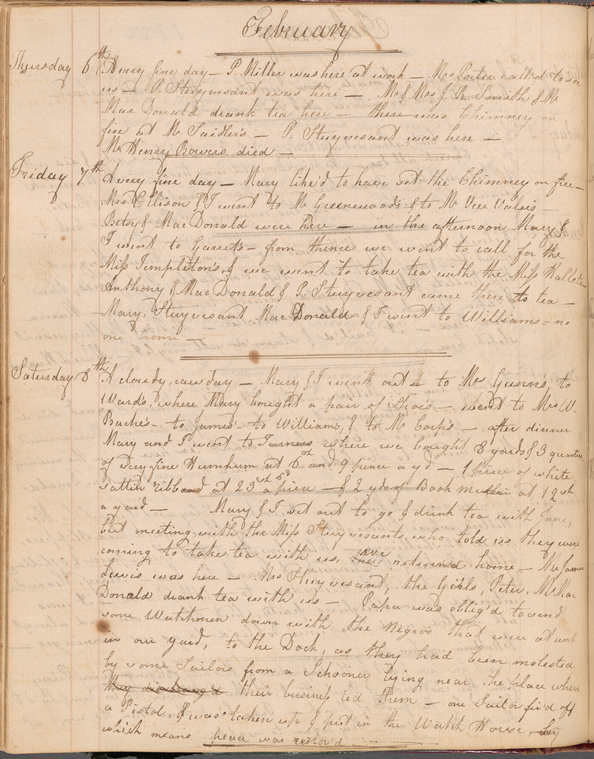Archives
Elizabeth De Hart Bleecker Diary, February 8, 1800
Saturday February 8, 1800 “bought a pair of shoes…. Mary & I went to go & drink tea with Jane…. Papa was oblig’d to send some watchmen down with the negro’s that were at work in our yard, to the Dock, as they had been molested by some sailors from a Schooner lying near the place where their business led them - one sailor fir’d off a Pistol, & was taken up & put in the Watch Tower, by which means peace was restor’d.”
Elizabeth De Hart Bleecker lived through a tumultuous period in the history of labor in New York City. In 1799, the New York legislature passed a bill for the gradual abolition of slavery in the state. Though it only applied to enslaved people born after July 4, 1799, the act surely changed the dynamics of labor in the city and beyond. It further blurred any easy distinctions between black laborers as unfree and white laborers as free.
The abolition Act compounded developments that were already underway. With the number of individual manumissions of enslaved people on the rise and a steady influx of recently freed people trickling in from New England and the New York countryside, the City's free Black population swelled. They worked hroughout the city and along the waterfront alongside enslaved men—who were often hired out—and laboring whites. Tensions brewed and sometimes boiled over, as Bleecker's diary entry attests.

Bleecker grew up aware of the varieties of free and unfree labor in New York. According to the 1800 federal census, her father still owned two slaves. They lived with the family at 178 Pearl Street, a short three-block walk from the East River and the bustling New York waterfront. On February 12th, a few days after this entry, Bleecker noted the wages her father paid to “the Negro men that were at work in the yard.”
Bleecker’s diary primarily records the quotidian daily activities of a well-heeled New York woman. Even when it does, it also captures some of the daily lives of men and women who left a much lighter historical footprint.
About the Early American Manuscripts Project
With support from the The Polonsky Foundation, The New York Public Library is currently digitizing upwards of 50,000 pages of historic early American manuscript material. The Early American Manuscripts Project will allow students, researchers, and the general public to revisit major political events of the era from new perspectives and to explore currents of everyday social, cultural, and economic life in the colonial, revolutionary, and early national periods. The project will present on-line for the first time high quality facsimiles of key documents from America’s Founding, including the papers of George Washington, Thomas Jefferson, Alexander Hamilton and James Madison. Drawing on the full breadth of the Library’s manuscript collections, it will also make widely available less well-known manuscript sources, including business papers of Atlantic merchants, diaries of people ranging from elite New York women to Christian Indian preachers, and organizational records of voluntary associations and philanthropic organizations. Over the next two years, this trove of manuscript sources, previously available only at the Library, will be made freely available through nypl.org.
Read E-Books with SimplyE
 With your library card, it's easier than ever to choose from more than 300,000 e-books on SimplyE, The New York Public Library's free e-reader app. Gain access to digital resources for all ages, including e-books, audiobooks, databases, and more.
With your library card, it's easier than ever to choose from more than 300,000 e-books on SimplyE, The New York Public Library's free e-reader app. Gain access to digital resources for all ages, including e-books, audiobooks, databases, and more.
If you don’t have an NYPL library card, New York State residents can apply for a digital card online or through SimplyE (available on the App Store or Google Play).
Need more help? Read our guide to using SimplyE.
